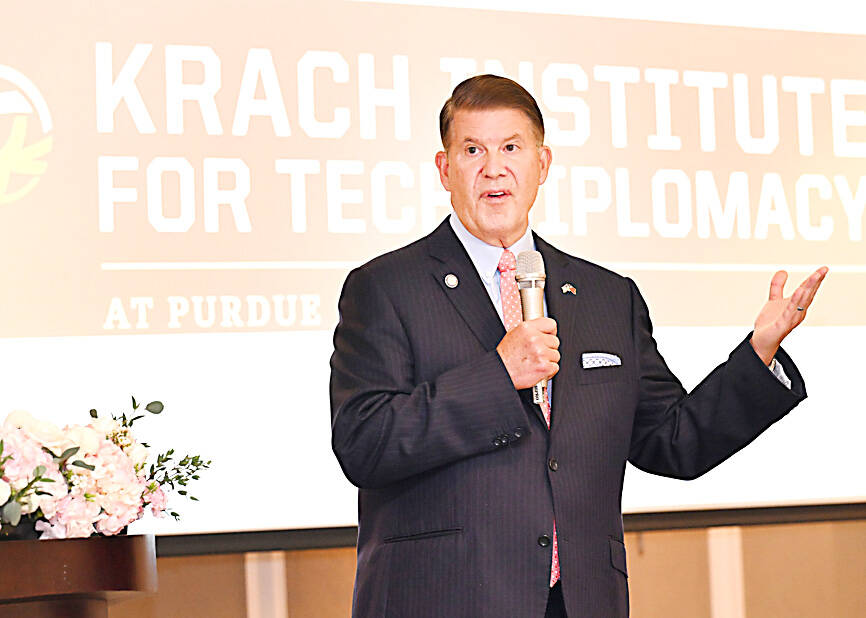Purdue University is launching a center to advocate for Taiwan as a trusted partner and encourage US investment in the nation, former US undersecretary of state for economic growth, energy and the environment Keith Krach told a news conference in Taipei yesterday.
Krach, chairman of the Krach Institute for Tech Diplomacy at Purdue, first announced plans for the establishment of the Taiwan Center for Innovation and Prosperity before his arrival in Taiwan on Wednesday for a four-day visit.
The center would be a partnership between public and private sectors in the US and Taiwan to “advocate for Taiwan internationally and attract more global partners,” the institute said.

Photo: Tien Yu-hua, Taipei Times
While Western firms are pulling out of China due to security concerns, Taiwan has great opportunities to attract investment with its skilled labor force and a friendly government, Krach said.
The center hopes to facilitate such cooperation, as well as help foster and strengthen customer relationships as, for example, more than half of Taiwan Semiconductor Manufacturing Co’s customer base is in the US, he said.
The partnership also looks to address the shortage of skilled labor, a topic he discussed extensively with President Tsai Ing-wen (蔡英文) during their meeting, Krach said.
Purdue is the only university that offers bachelor’s, master’s and doctorate programs in semiconductor engineering and is a top university in national security research, he said.
By signing memorandums of understanding with National Chengchi University and National Yang Ming Chiao Tung University, the center is to provide tech diplomacy training for the private sector as well as diplomats, he said.
It is also to accelerate innovation, from research to development and adoption of trusted technology with its venture capital capabilities and mentor network, he added.
US President Joe Biden last year signed the Creating Helpful Incentives to Produce Semiconductors (CHIPS) and Science Act, which provides billions of US dollars for research in critical national security sectors such as biotechnology, cybersecurity, autonomous vehicles and aerospace.
“I think the opportunities for Taiwan to participate in that is huge,” Krach said.
Krach is also chairman of the Global Tech Security Commission, where Minister of Digital Affairs Audrey Tang (唐鳳) serves as a commissioner as Taiwan’s representative.
Tang is going to “play a pivotal role” in developing a set of trusted tech standards, Krach said.
Asked about Taiwan’s presidential election in January next year, Krach said that he hoped Taiwanese can select a transformational leader who has courage, like President Tsai.
“All eyes are on Taiwan. Taiwan is the linchpin of democracy,” he said. “I think if there’s anything that I’ve learned from the people of Taiwan, there is no prosperity without freedom.”

Taiwan is to commence mass production of the Tien Kung (天弓, “Sky Bow”) III, IV and V missiles by the second quarter of this year if the legislature approves the government’s NT$1.25 trillion (US$39.78 billion) special defense budget, an official said yesterday. Commenting on condition of anonymity, a defense official with knowledge of the matter said that the advanced systems are expected to provide crucial capabilities against ballistic and cruise missiles for the proposed “T-Dome,” an advanced, multi-layered air defense network. The Tien Kung III is an air defense missile with a maximum interception altitude of 35km. The Tien Kung IV and V

The disruption of 941 flights in and out of Taiwan due to China’s large-scale military exercises was no accident, but rather the result of a “quasi-blockade” used to simulate creating the air and sea routes needed for an amphibious landing, a military expert said. The disruptions occurred on Tuesday and lasted about 10 hours as China conducted live-fire drills in the Taiwan Strait. The Civil Aviation Administration (CAA) said the exercises affected 857 international flights and 84 domestic flights, affecting more than 100,000 travelers. Su Tzu-yun (蘇紫雲), a research fellow at the government-sponsored Institute for National Defense and Security Research, said the air

A strong continental cold air mass is to bring pollutants to Taiwan from tomorrow, the Ministry of Environment said today, as it issued an “orange” air quality alert for most of the country. All of Taiwan except for Hualien and Taitung counties is to be under an “orange” air quality alert tomorrow, indicating air quality that is unhealthy for sensitive groups. In China, areas from Shandong to Shanghai have been enveloped in haze since Saturday, the ministry said in a news release. Yesterday, hourly concentrations of PM2.5 in these areas ranged from 65 to 160 micrograms per cubic meter (mg/m³), and pollutants were

Taiwan’s armed forces have established response protocols for a wide range of sudden contingencies, including the “Wan Chun Plan” to protect the head of state, the Ministry of Defense (MND) said today. After US President Donald Trump on Saturday launched a series of airstrikes in Venezuela and kidnapped Venezuelan President Nicolas Maduro, concerns have been raised as to whether China would launch a similar “decapitation strike” on Taiwan. The armed forces regularly coordinate with relevant agencies and practice drills to ensure preparedness for a wide range of scenarios, Vice Minister of National Defense Hsu Szu-chien (徐斯儉) told reporters before a